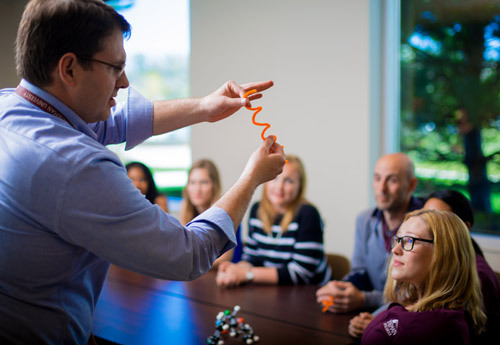Doctor of Nursing Practice – Family Nurse Practitioner (DNPFNP) Degree Program
Earn Your Doctor of Nursing Practice degree, and your MSN, along the way!


Roseman’s 32-month, full-time, online Doctor of Nursing Practice—Family Nurse Practitioner (DNPFNP) program is designed for nurses with a Bachelor of Science in Nursing (BSN) degree who wish to achieve the highest level of nursing practice and prepare for the national call to elevate the academic preparation of nurses to the doctoral level.
“We are very excited to offer the DNPFNP to nurses, as the demand for nurse practitioners is rapidly growing, with the BLS citing nurse practitioners as the third fastest growing occupation between 2022-2033. For students wishing to achieve the highest level of training with a DNP, our graduates will be prepared to practice, lead, advocate, educate and make a difference in the world.” –Jason Major, DNP, MSN, FNPBC, APRN, Director of Family Nurse Practitioner Program, College of Nursing
At Roseman, we believe in innovative education. Our Six-Point Mastery Learning Model® sets us apart, facilitating deep, active learning, reducing competition, and increasing collaboration among students. This unique approach, coupled with early exposure to healthcare settings, builds your competence, mastery, and confidence from the start of your journey. As a DNPFNP graduate, you’ll be equipped for diverse roles: practicing as a Family Nurse Practitioner, leading in healthcare administration, teaching in academia, conducting research, improving healthcare quality, and advocating for patients. You’ll develop advanced skills in leadership, policy, and evidence-based practice, preparing you to shape the future of healthcare.
DNPFNP Program Fast Facts
- Program Duration: Thirty-two (32) months
- Modality: Online with two (2) short residency experiences and in-person at the student’s clinical site for clinical experiential blocks
- July 2026 start
- Interprofessional training opportunities
 Nevada ranked among the top 5 states with the highest-earning college graduates. Roseman University is the college with the highest earners in the state.*
Nevada ranked among the top 5 states with the highest-earning college graduates. Roseman University is the college with the highest earners in the state.*
*2024 Report by DegreeChoices.com with data collected from College Scorecard, an initiative of the U.S. Department of Education that compiles reliable data on colleges and universities, allowing users to search and compare colleges based on various indicators like costs and earnings.
Duration
Thirty-two (32) months
Location
Modalities
- Online
- Two (2) short residency experiences and in-person at student’s clinical site for clinical experiential blocks
DNPFNP Program Information
- Receipt of completed admissions application, application fee, and official transcripts
- Bachelor of Science in Nursing from an approved regionally or nationally accredited college or University (ACEN, CCNE or CNEA)
- Minimum GPA of 3.0 Cumulative in Nursing undergraduate coursework
- Undergraduate statistics course (completed within 10 years of applying to the program) with a “B” or better
- Personal Interview: A personal interview with the interview committee (By invitation)
- Unencumbered license or eligibility for RN licensure in the state where clinical hours will be completed
- One year of clinical experience as an RN preferred
- Current Curriculum Vitae (CV)
- TOEFL scores and Foreign Transcripts from WES or Josef Silny and Associates (If applicable)
- Submission of a personal statement describing the applicant’s personal career goals and interest in becoming a DNPFNP (1-2 pages maximum)
- Two letters of recommendation (Likert scale)
- Official transcripts from every accredited US college or university attended
*Note: Meeting the minimum application requirements is not a guarantee for admission.
To apply to the DNPFNP program, your application and supplemental application can be submitted via Nursing CAS. The link to the supplemental application can be found under the program materials section of the Nursing CAS application.
Tuition: $60,400 ($35,400 MSN) ($25,000 DNP)
Seating Deposit: $250
Technology Fee: $500
Instructional Material Fee: $2,500 ($1,500 MSN) ($1,000 DNP)
Health Insurance: $3,528 estimate (Waived if student provides required proof of insurance by deadline provided by Student Services Office)
Overview of Financial Aid Options
Roseman University offers a variety of financial aid options to help students manage the cost of their education. These include scholarships, grants, loans, and work-study opportunities.
Scholarships
Roseman provides institutional scholarships to eligible students. Each academic program has specific deadlines and requirements. Additionally, students can explore external scholarships recommended by the Financial Aid Office.
Grants
Grants are awarded based on financial need and do not require repayment. Roseman University offers:
- Pell Grants – Available to undergraduate students pursuing their first bachelor’s degree who demonstrate high financial need.
- Federal Supplemental Educational Opportunity Grants (FSEOG) – Offered to Pell Grant recipients with exceptional financial need.
Loans
Loans must be repaid, and students should borrow responsibly. Available options include:
- Federal Direct Subsidized Loans – For undergraduates with financial need; the U.S. Department of Education covers interest while in school.
- Federal Direct Unsubsidized Loans – Available to undergraduate and graduate students, regardless of financial need.
- Grad PLUS Loans – Credit-based loans for graduate students.
- Parent PLUS Loans – Credit-based loans available to parents of dependent undergraduate students.
- Private Student Loans – Credit-based loans from private lenders with varying interest rates.
- Roseman Success Fund Income Share Loan (ISL) – Available to students unable to secure credit-based loans, requiring acceptance of federal loan offers first.
Federal Work-Study (FWS)
This program provides part-time job opportunities for students with financial need, allowing them to earn income while focusing on their education. Positions may involve community service or work related to the student’s field of study.
To explore financial aid opportunities at Roseman University, visit our financial aid webpage for resources and guidance on funding your education at a top health sciences university.
Year 1
Year 1 didactic material will be delivered online, a mix of DNP essential coursework, foundational science courses, healthcare informatics, organizational management, and core advanced practice coursework. Towards the end of Year 1, students will begin their clinical experiential learning in the Adult/Gerontology block.
Year 2
In the second year, the curriculum becomes a blended clinical and didactic curriculum, with clinical experiential learning blocks focusing on Women’s Health, Pediatrics, and the Family.
Students must complete a total of 750 approved direct patient-care clinical practicum hours as partial completion of the requirements for the MSN degree program. Clinical placements are to be secured through partnership with faculty, students, and the clinical site. Students progressing through the DNP degree are required to complete an additional 250 approved indirect patient-care practicum hours. At the conclusion of Year 2, students will be eligible to earn their MSNFNP.
Year 3
The final year of the DNPFNP is spent earning final practicum hours, as well as completing Evidence-Based Practice I, and II and well as the Doctoral Project Practicum and Seminar, focusing on the implementation and evaluation of the scholarly project.
The clinical practicum courses offer nurse practitioner students an opportunity to apply newly developed skills and relate theoretical concepts to advanced practice nursing situations in non-acute care settings with varying cultural populations across the lifespan. This professional experiential learning helps further prepare students for the highest level of advanced practice. Practicum experiences allow students to enhance skills in communication, teamwork, critical thinking and professionalism and differentiate primary care needs for individuals at different stages of life. Students must complete a total of 750 approved direct patient-care clinical practicum hours as partial completion of the requirements for the MSN-FNP degree program. Clinical placements are to be secured through partnership with faculty, students, and the clinical site. Students progressing through DNP degree are required to complete an additional 250 approved indirect patient-care practicum hours. These practicum hours are part of the scholarly project. Both clinical and practicum hour may be completed in your state of residence upon approval.
This is a writing intensive program, however there are several resources available to students to facilitate their success. This includes the Roseman University of Health Sciences Library which provides many services and resources to support the DNP student in their evidence-based research and completion of their scholarly projects.
The College of Nursing Research & Learning Librarian provides library instruction and research support to all nursing students via the Canvas Learning Management System (LMS), online consultations, phone, email and in person. Library resources, interactive tutorials, online guides, and instruction modules are also embedded in the Canvas LMS.
The master’s degree program in nursing at Roseman University of Health Sciences is accredited by the Commission on Collegiate Nursing Education (CCNE) (http://www.ccneaccreditation.org).
The Doctor of Nursing Practice program at Roseman University of Health Sciences is pursuing initial accreditation by the Commission on Collegiate Nursing Education (http://www.ccneaccreditation.org). Applying for accreditation does not guarantee that accreditation will be granted.
Lead. Practice. Increase Access to Quality Healthcare.

Six-Point Mastery Learning Model®
Roseman University strives to produce competent graduates in an educational environment that ensures high levels of achievement from all students and fosters cooperation and collaboration in the learning process. This is the concept of mastery learning.

Classroom As Teacher

Block Curriculum

Active & Collaborative Learning

Competency-Based Education

Assessment Learning

Early Experiential Learning
Get Started
Meet With an Advisor
Have questions about the DNPFNP program? Connect with an admissions counselor to get personalized guidance and more information.
Contact UsView Academic Programs
Exploring your options? Browse our academic programs to find the right path for your healthcare career.
Learn More